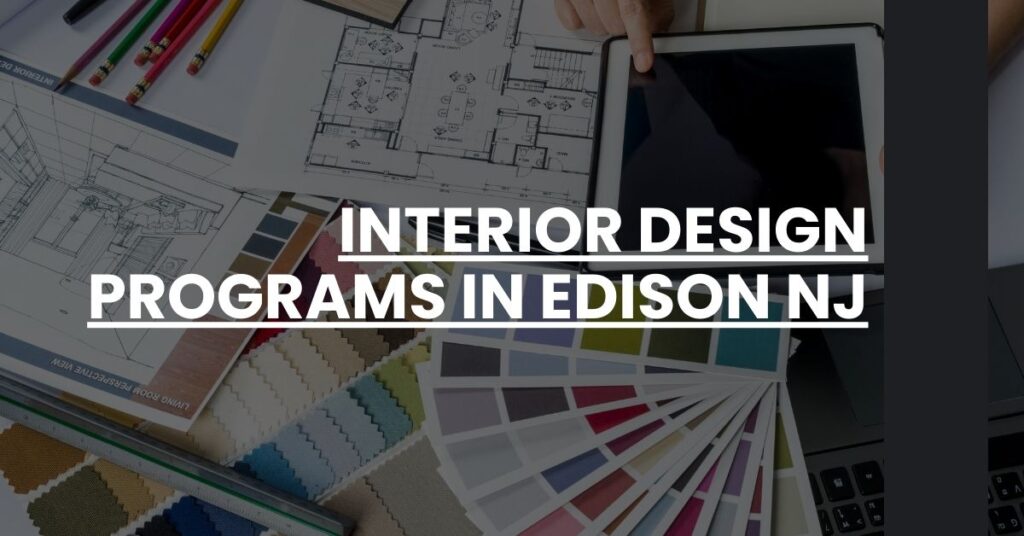Not in Edison? Check out our lists of Interior Design Programs in Elizabeth, Jersey City, Lakewood, Newark, Paterson, Woodbridge, and across New Jersey.
Feeling overwhelmed by choosing an interior design program in Edison, NJ?
Discover the best options that combine quality education, practical experience, and industry connections.
This guide covers top-rated programs, ensuring you find the ideal fit for your career aspirations.
Berkeley College – Interior Design Program
Berkeley College in Edison, NJ, offers a robust Interior Design Program that equips students with the necessary skills for a successful career in interior design. This program is ideal for those seeking both practical training and theoretical knowledge.
- Design Principles and Space Planning: You will learn essential design principles and how to use space efficiently.
- Drafting and CAD: Gain expertise in drafting and computer-aided design (CAD).
- 3D Digital Visualization: Prepare for industry demands with cutting-edge technology.
The program emphasizes hands-on learning through valuable real-life design projects and collaboration with experienced industry professionals. Situated in Edison, the program provides access to a vibrant design community and abundant networking opportunities.
Flexibility is another key advantage. Berkeley College offers both online and on-campus classes to cater to diverse student needs. Experienced faculty members, who bring real-world insights into the classroom, enrich the learning experience significantly.
Financial aid options are also available to help manage tuition expenses, making this program accessible for many aspiring designers. Moreover, the curriculum is accredited by the Middle States Commission on Higher Education, reflecting high academic standards.
Consider whether Berkeley College aligns with your career aspirations. If interested, learn more here.
Hillier College of Architecture and Design at NJIT – Interior Design Program
The Hillier College of Architecture and Design at NJIT, located in Newark, NJ, offers a unique and interdisciplinary Interior Design program. This program is one of the few that combines interior design, architecture, industrial design, and digital design under one roof.
Key Highlights:
- Foundation Year: Covers fundamental topics like design principles, color theory, and art history.
- Design Studios: Six semesters of intensive design studios.
- Comprehensive Curriculum: Courses in building and interior systems, history of furniture, and contract documents.
The program offers a well-rounded education, preparing students for entry-level practice, advanced study, and the NCIDQ Exam. Accredited by the Council for Interior Design Accreditation (CIDA), it ensures a high standard of learning.
NJIT’s program boasts impressive metrics, such as a 92% retention rate and an 83% four-year graduation rate. Furthermore, 100% of graduates find employment in interior design or related fields.
The program’s industry connections are robust. Graduates have interned and worked at renowned firms like Gensler and Rockwell Group.
If you’re seeking a comprehensive education and solid career prospects, consider learning more about NJIT’s Interior Design program here.
Kean University – Bachelor of Fine Arts (BFA) in Interior Design
Kean University in Edison, NJ, offers a Bachelor of Fine Arts (BFA) in Interior Design. This program focuses on creating functional and aesthetically appealing spaces tailored to client needs.
- Creative and Technical Solutions: Emphasizes design solutions that align with building codes and sustainability principles.
- Research and Analysis: Teaches a research-oriented approach to meet project goals.
- Client-Centric Design: Ensures designs are tailored to client needs and preferences.
The program is accredited by the Council for Interior Design Accreditation (CIDA), preparing students for the NCIDQ Exam and entry-level practice.
The BFA is a 120-credit hour degree that can be completed in four years for full-time students or two years for transfer students. The experienced faculty, including experts like Linda O’Shea and Manuel Divino, provide valuable insights and mentorship.
Students take part in design competitions and benefit from the Michael Graves College Lecture Series. The program boasts high retention (92%) and graduation rates (83%), with 67% of graduates employed in the field.
If this aligns with your goals, explore Kean University’s Interior Design program.
NJIT – Interior Design Program
NJIT offers a four-year professional Interior Design program accredited by the Council for Interior Design Accreditation (CIDA). This program focuses on comprehensive education to prepare students for a career in interior design.
- Core Curriculum: Includes courses like Color and Composition, History of Art and Design, and Computer Programming.
- Studio Courses: Interior Design Studio I to V, essential for hands-on learning.
- Building Systems Courses: Cover building and interior systems and architectural history.
For those interested in graduate studies in architecture, Calculus is a required course. The program also includes a robust set of general education requirements in history, humanities, and social sciences.
To graduate, students must complete 120 credits with a minimum GPA of 2.0. The curriculum’s balance between theory and practice ensures students are well-prepared for industry demands.
Consider exploring more about the NJIT Interior Design program.
Fashion Institute of Technology (FIT) – Interior Design Program
The Fashion Institute of Technology (FIT) offers a well-regarded Interior Design program. With options for an Associate in Applied Science (AAS) and a Bachelor of Fine Arts (BFA), this program is versatile and adaptable to various career stages.
- AAS Degree: Prepares you for entry-level positions or to continue into the BFA program.
- BFA Degree: Emphasizes human-centered and evidence-based design, tackling social concerns, ergonomics, and sustainability.
- Accreditation: Both degrees are accredited by the Council for Interior Design Accreditation (CIDA), ensuring high standards of education.
Internships with prestigious firms like Gensler and Rockwell Group boost career prospects. FIT graduates are often employed as interior designers and consultants across various settings. The curriculum includes a two-semester capstone project, a senior thesis, and professional portfolio development.
Prominent alumni such as Tony Chi and Jesse Carrier exemplify the success you can achieve with an FIT education. The program fosters creativity, inclusiveness, and community, preparing you to design innovative, human-centered spaces.
Explore the program further at FIT Interior Design.
County College of Morris – Interior Design Program
The County College of Morris (CCM) in Edison, NJ offers a thorough Interior Design program. This involves a 30-credit design core and a specialization in the interior design track.
- Design Core: Courses such as 2D For Designers, Color Theory, Design Concepts, Design Rendering, Drawing, and History of Design.
- Portfolio Preparation: Essential for professional applications or further education.
- Technology: Emphasis on CAD and drafting, with tools like AutoCAD and Adobe Revit in state-of-the-art studio classrooms.
- Personalized Education: Small class sizes (13:1 ratio) enable personalized mentorship.
Your education is guided by accomplished faculty members who are practicing professionals. This ensures that real-world problems are integrated into classroom instruction.
An active campus life, with over 50 student clubs, facilitates networking and engagement opportunities. CCM’s robust program builds a strong foundation in both visual arts and practical skills for a successful career in interior design.
Learn more about the CCM Interior Design program.
Key Factors to Consider When Choosing an Interior Design Program
Selecting the ideal interior design program can significantly impact your career. Here are key factors to consider:
- Accreditation: Ensure the program is accredited by reputable bodies such as the Council for Interior Design Accreditation (CIDA). Accreditation reflects adherence to high educational standards and can affect employability.
- Curriculum: The curriculum should include fundamental subjects such as design principles, space planning, CAD, and sustainability. A mix of practical and theoretical learning is essential.
- Location: Programs located in design hubs offer access to industry networks and job opportunities, providing a strategic advantage.
- Faculty Credentials: The expertise and professional experience of faculty members are crucial. They should bring real-world insights and mentorship into the classroom.
- Internship Opportunities: Internships provide valuable real-world experience and can significantly enhance your employment prospects after graduation.
- Learning Format: Consider whether the program offers online, on-campus, or hybrid learning options to suit your lifestyle and learning preferences.
- Financial Aid: Investigate scholarships, grants, and other financial aid options that can make your education more affordable.
- Student Success Metrics: Look at retention rates, graduation rates, and job placement rates as indicators of the program’s effectiveness and graduate preparedness.
By considering these factors, you can find an interior design program in Edison, NJ, that aligns with your career goals and prepares you for a successful future in the industry.
Conclusion: Making Your Interior Design Dreams a Reality
Choosing the right interior design program in Edison, NJ, requires thoughtful consideration of various factors. From accreditation to curriculum and faculty expertise, each element plays a vital role in your education and career readiness.
Explore the available options, assess your needs, and take the next step toward a promising career in interior design. Begin your journey by visiting the links provided and learning more about each program’s unique offerings.
Embark on your path to creating functional and beautiful spaces, and ensure you are well-prepared to meet the demands of a dynamic and rewarding industry.

